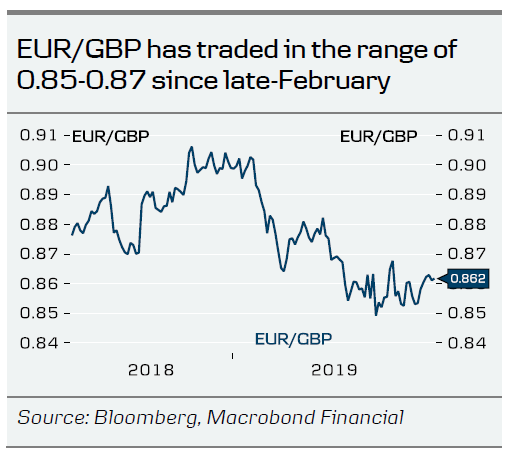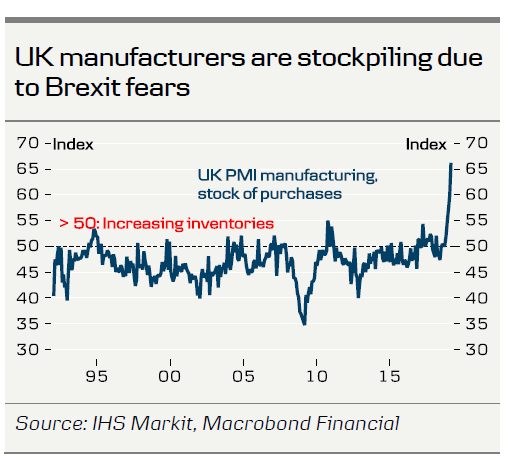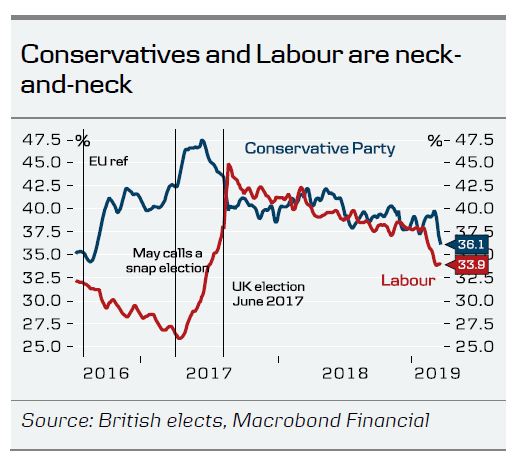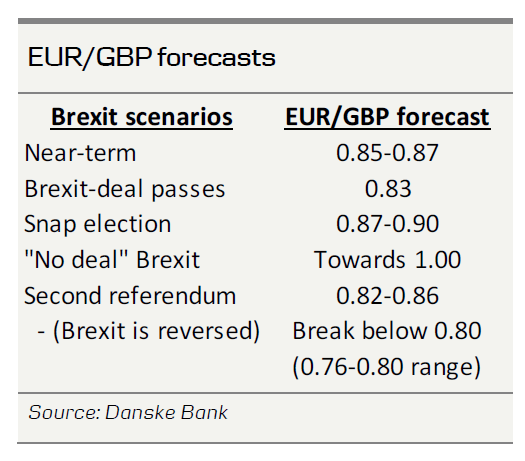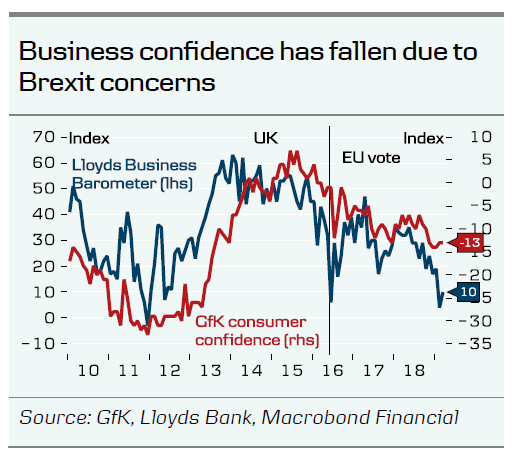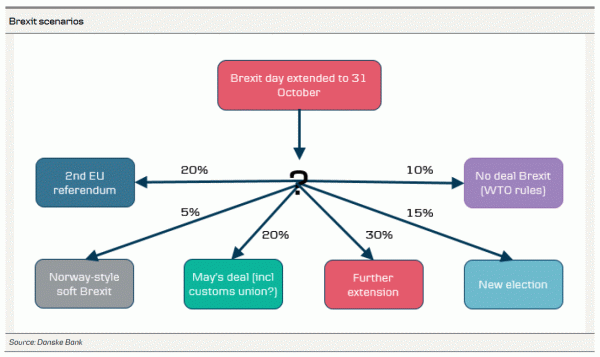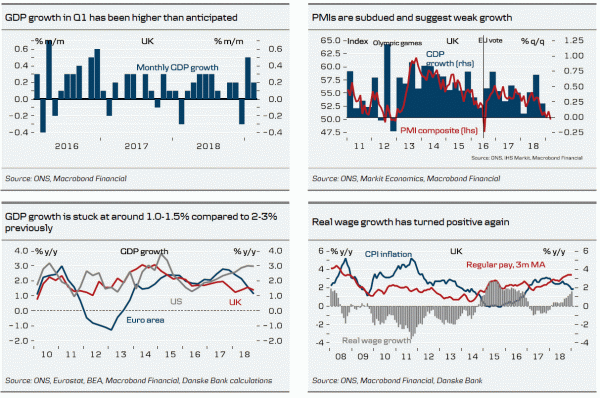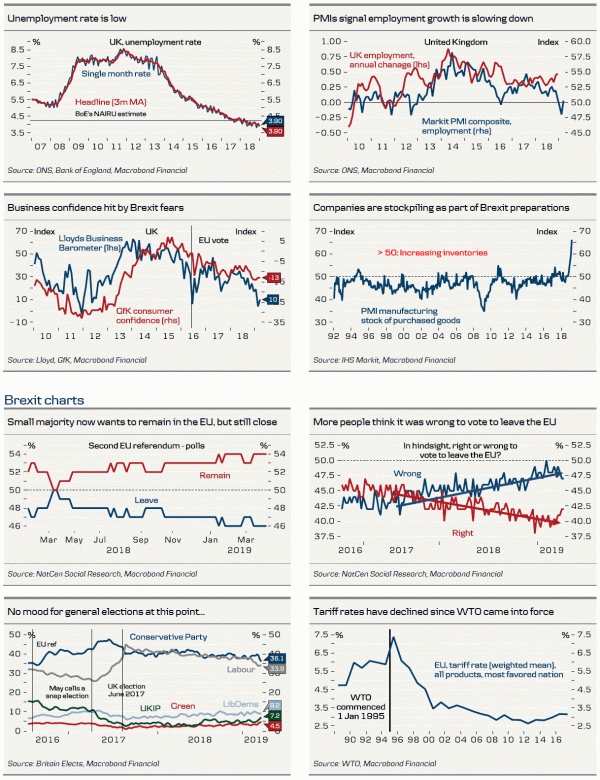Key takeaways
- The EU has granted an extension to 31 October and some EU leaders already appear open to the possibility of a further extension if needed.
- Near term, we monitor the response in the UK. The Conservative backbenchers want to get rid of Theresa May.
- Look out for local elections on 2 May and European elections on 23 May. Mood for snap election is low.
- No signs of imminent breakthrough in cross-party talks.
- We expect EUR/GBP will remain in the 0.85-0.87 range for now. Markets likely to focus on other things than Brexit now.
- Extension not only for the better from an economic perspective.
And now back to the UK…
After a very long meeting last night, EU leaders decided to grant the UK a ‘medium’ extension to 31 October (including taking stock in June). While a majority of the EU leaders wanted a long extension of 9-12 months, French President Macron played hard ball and argued for a much shorter extension. The extension is conditional on no reopening of the withdrawal agreement, participation in European elections and ‘sincere cooperation’. The UK government has accepted the offer, meaning that the new Brexit day is now officially 31 October and the agreement does not need approval in the House of Commons (EU law is above British law). After the EU summit, German Chancellor Merkel sounded open to the possibility of a further extension.
Now, we will monitor the British politicians’ reaction. While Conservative Party rules say there cannot be another no confidence vote in May’s party leadership until December, the leaders of the Conservative backbenchers (the so-called 1922 committee) decided yesterday they will try to persuade May to quit soon. A bad local election on 2 May or bad European elections on 23 May may be what is needed to force Theresa May out. The problem is, however, that there is no obvious successor and a leadership contest may take up a lot of energy and time. May has no intention of stepping down.
It is difficult to predict what is going to happen but as it seems unlikely that the House of Commons will back Theresa May’s deal and a breakthrough in the cross-party talks does not seem imminent, it may end up being the case that the EU leaders will have to decide once again in October. Right now, it is our base case but much can happen from here to October, see game tree on page 3.
The mood for a snap election is low but cannot be ruled out. While the Prime Minister previously had this nuclear option, the fixed term act means a snap election can only be called if Parliament dissolves itself by a two-thirds majority or the government loses a no confidence vote (and no new government is formed within 14 days). Otherwise, the next election is in 2022. Polls show Labour and Conservatives are neck-and-neck and the Conservatives risk both losing power to Labour and the whole Brexit process (with a higher probability of Brexit being reversed under a Labour government).
May’s deal, permanent customs union or second EU referendum With respect to the Brexit end-game, we think there are three options from here: May’s deal as it is (if the DUP and Brexiteers get so afraid of the extension that they eventually back the deal), May’s deal including a permanent customs union (if cross-party talks with Labour succeed, with the risk of splitting the parties) or a second EU referendum (a small majority is now in favour of remaining in the EU, although it is only very slim and uncertainty is high).
A no deal Brexit seems unlikely, as both the UK and EU have blinked, in our view, but of course we cannot rule it out completely. The idea of a soft Brexit (single market or single market and customs union) seems dead after the indicative votes held in the House of Commons.
EUR/GBP to stay in the 0.85-0.87 range near term
EUR/GBP was little changed after the EU leaders decided to grant the UK a medium-long extension to October and, for now, we think the cross will continue to trade in the 0.85- 0.87 range.
In case of a no deal Brexit, we still expect EUR/GBP to move towards parity. We still expect EUR/GBP to move down to 0.83 if the Withdrawal Agreement passes. Without the extension to October and with no imminent breakthrough, markets are likely to start focusing on other things than Brexit.
Extension prolongs period with high uncertainty
From an economic perspective, a long extension means we avoid a disastrous no deal Brexit tomorrow. However, the extension is not only for the better, as the period with high uncertainty for companies is prolonged, which would continue to have damaging effects on the economy. There is much evidence that companies have stockpiled due to no deal Brexit fears. Business investments in the UK fell in all four quarters last year, as companies have postponed or cancelled investment projects. Note also that EU27 companies are referring to Brexit uncertainties as a negative factor in e.g. businesses surveys.

